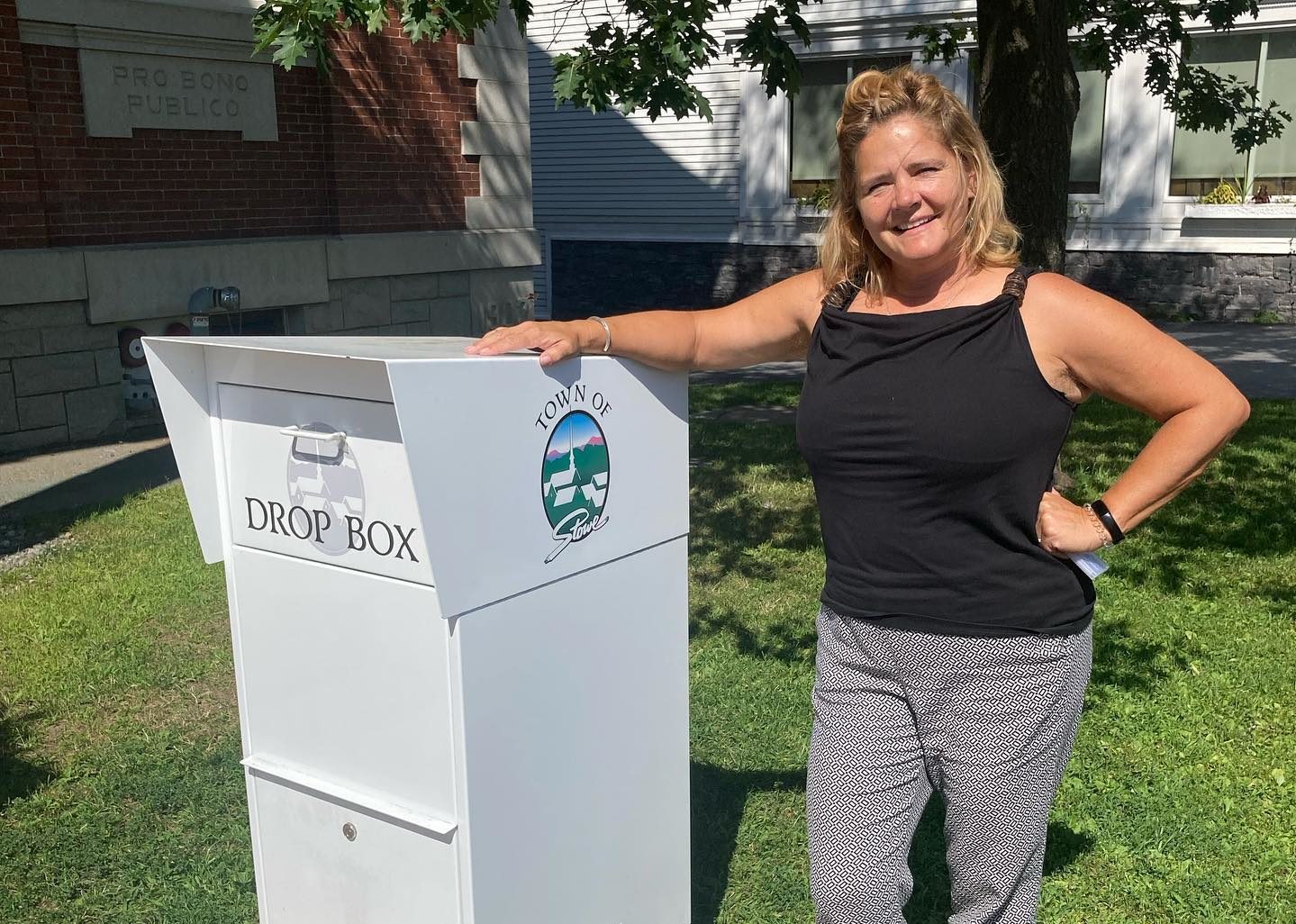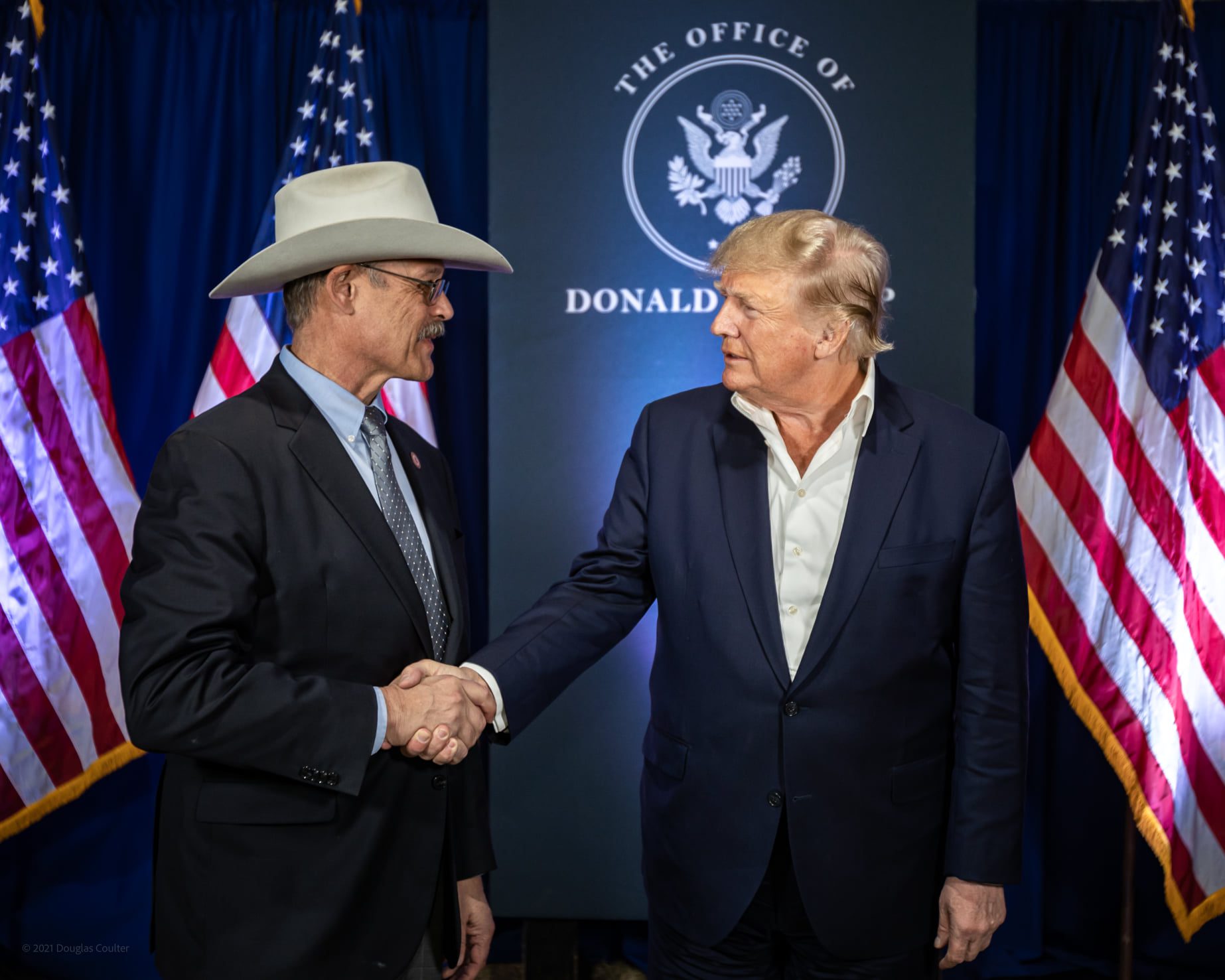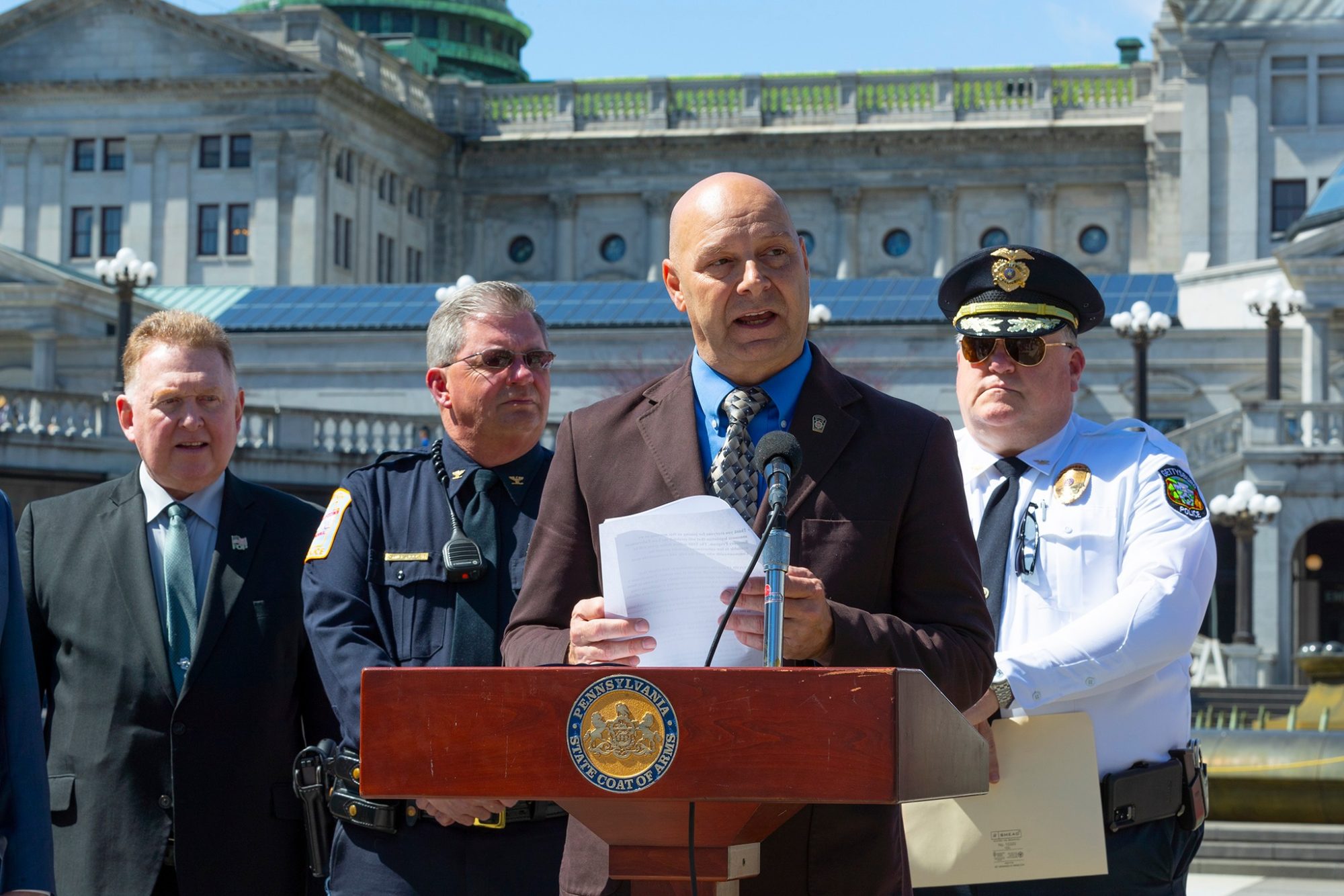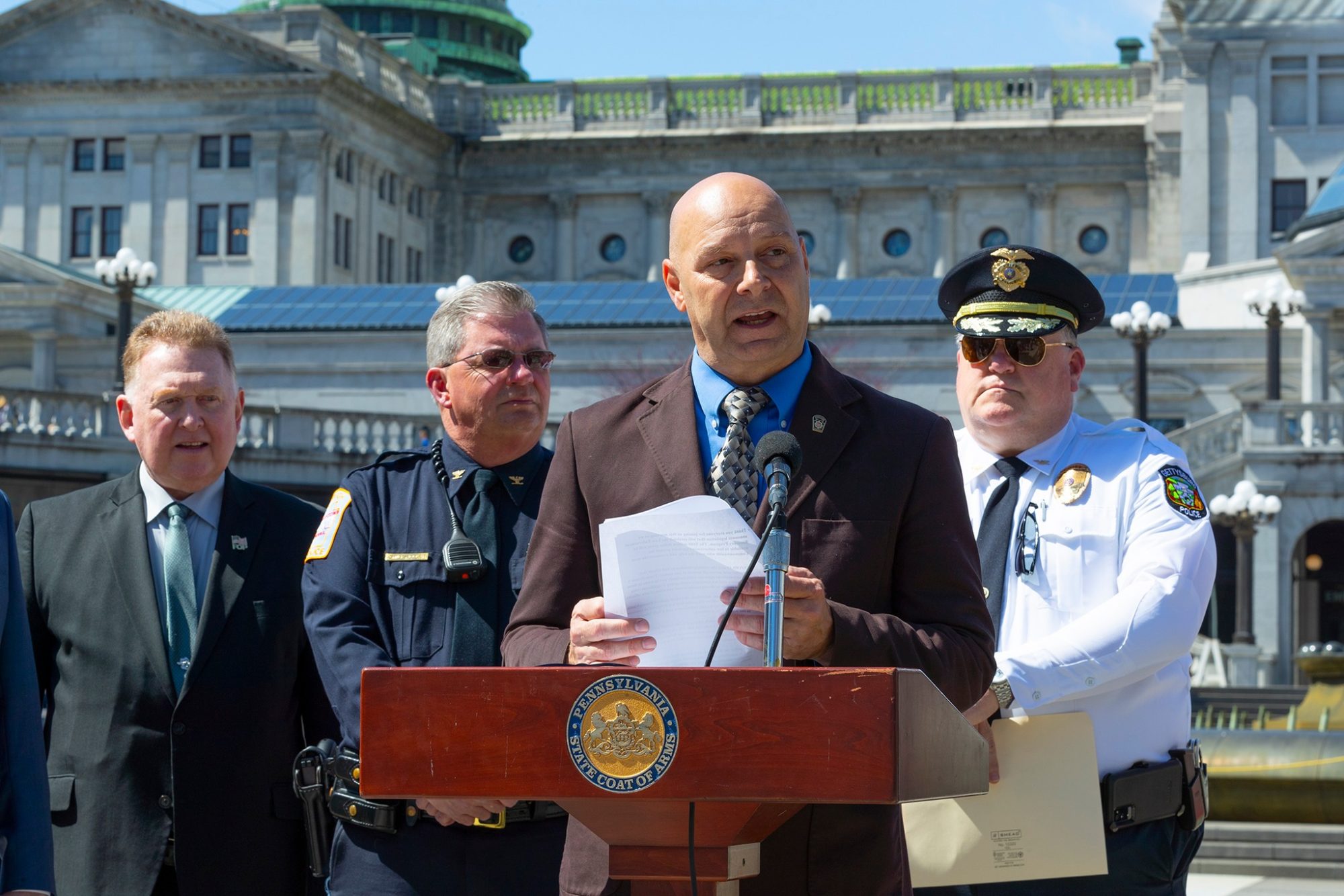In Secretary of State Races, Election Deniers (Mostly) Lose
All Trump-endorsed candidates crashed out in battleground states, but purveyors of the Big Lie will take over election administration in four red states.
Camille Squires, Daniel Nichanian | November 14, 2022
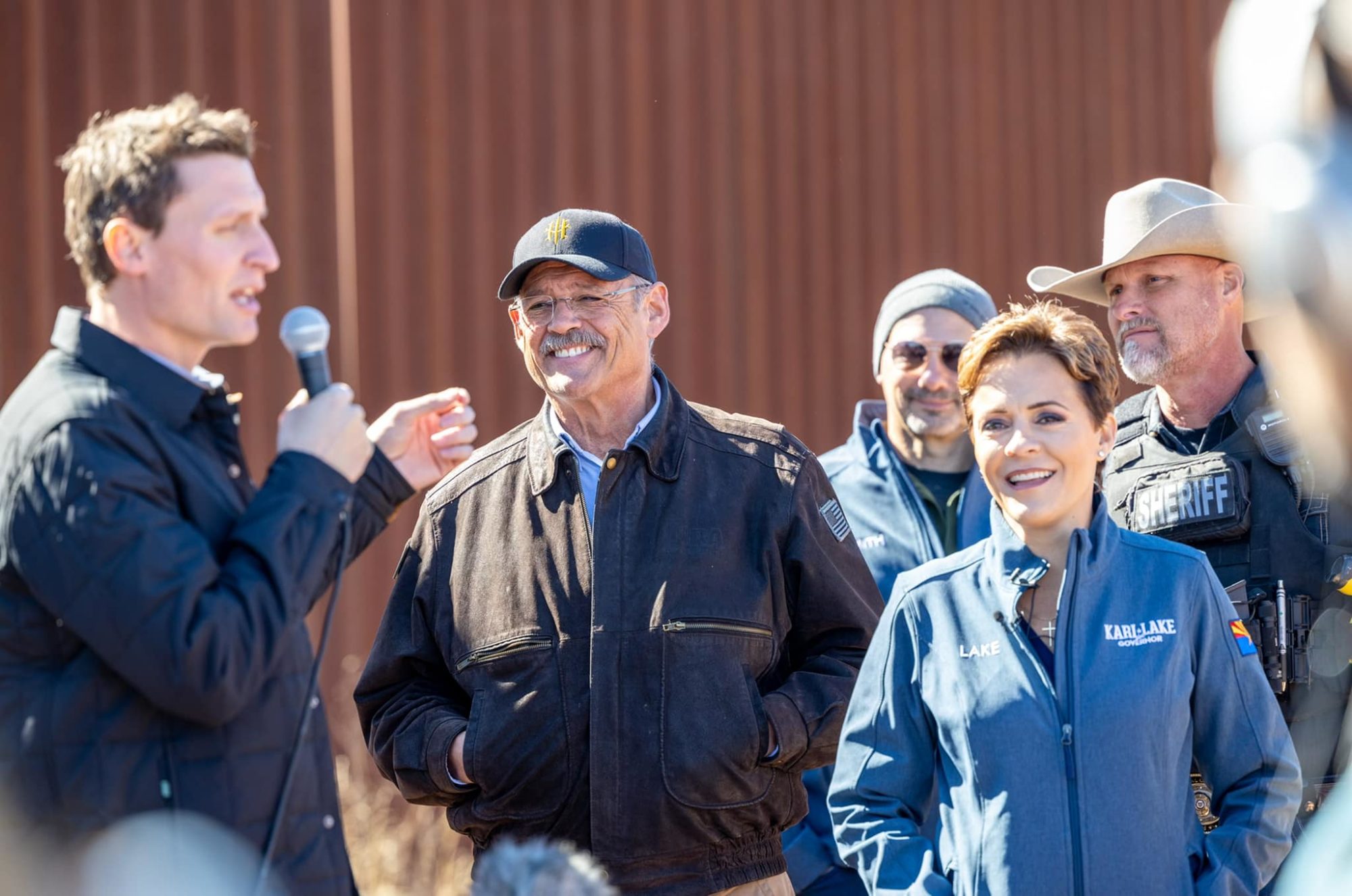

“Sometimes the vote counter is more important than the candidate,” Donald Trump told Pennsylvania Republicans in January. Ever since his failure to cling to power in 2020, he had hoped to install allies into the offices that run and certify elections in 2022. In Pennsylvania, his chosen vehicle was Doug Mastriano, a lawmaker who two years ago responded to Trump’s loss in the state by plotting to overturn it. Running for governor this year, Mastriano promised to appoint a like-minded secretary of state, with the risk of throwing the state’s election process into chaos in 2024.
Pennsylvanians on Tuesday resoundingly rejected the man who had wanted to ignore their vote but now was asking for it. In this perennially tight state, Mastriano lost to Democratic nominee Josh Shapiro by fifteen percentage points.
He was joined in defeat by many other Republicans who echoed Trump’s Big Lie while trying to take over their states’ election administration. (Most states directly elect a secretary of state, unlike in Pennsylvania.) Voters around the country repudiated candidates who signaled they may override the will of the very electorate they were courting.
All election deniers who ran for secretary of state in battleground states—buoyed by endorsements from Trump—lost on Tuesday, blocking major avenues for the former president to manipulate the next election.
Jim Marchant, the Republican nominee in Nevada, came closest, losing to Democrat Francisco Aguilar by two percentage points. In Michigan, Minnesota, and New Mexico, incumbent Democratic secretaries of state crushed their far-right challengers Kristina Karamo, Kim Crockett, and Audrey Trujillo by margins ranging from 9 to 14 percentage points—all far more than Joe Biden’s margins of victory two years ago.
Mark Finchem, an Arizona lawmaker who has since 2020 championed proposals to decertify his own state’s presidential results, repeated just this fall that the votes of Arizona’s two most populous counties should be “tossed out.” He lost his bid on Tuesday, trailing in both of these counties decisively.
Election deniers also failed to take over secretary of state offices in blue states like Massachusetts and Vermont, lost elections for governor in places where the winner can appoint a secretary of state, and fell short for other offices from which they may have exerted significant if indirect influence on elections, such as Michigan’s attorney general or New Mexico’s supreme court.
“The Big Lie movement has its die hard acolytes, and they’ve captured a huge swath of the Republican Party, but it’s not a winning majority,” Ian Bassin, executive director of the organization Protect Democracy, told Bolts. “In fact, it’s politically toxic, and in competitive states is a lead anchor around the neck of anyone that embraces it.”
Still, Republicans who ran on the Big Lie did not end up empty handed.
A nationwide Bolts analysis in September found that 12 Republicans were running for secretary of state after denying the results of the 2020 election or refusing to affirm the outcome. Eight of them lost. But they won in four red states: Alabama, Indiana, South Dakota, and Wyoming.
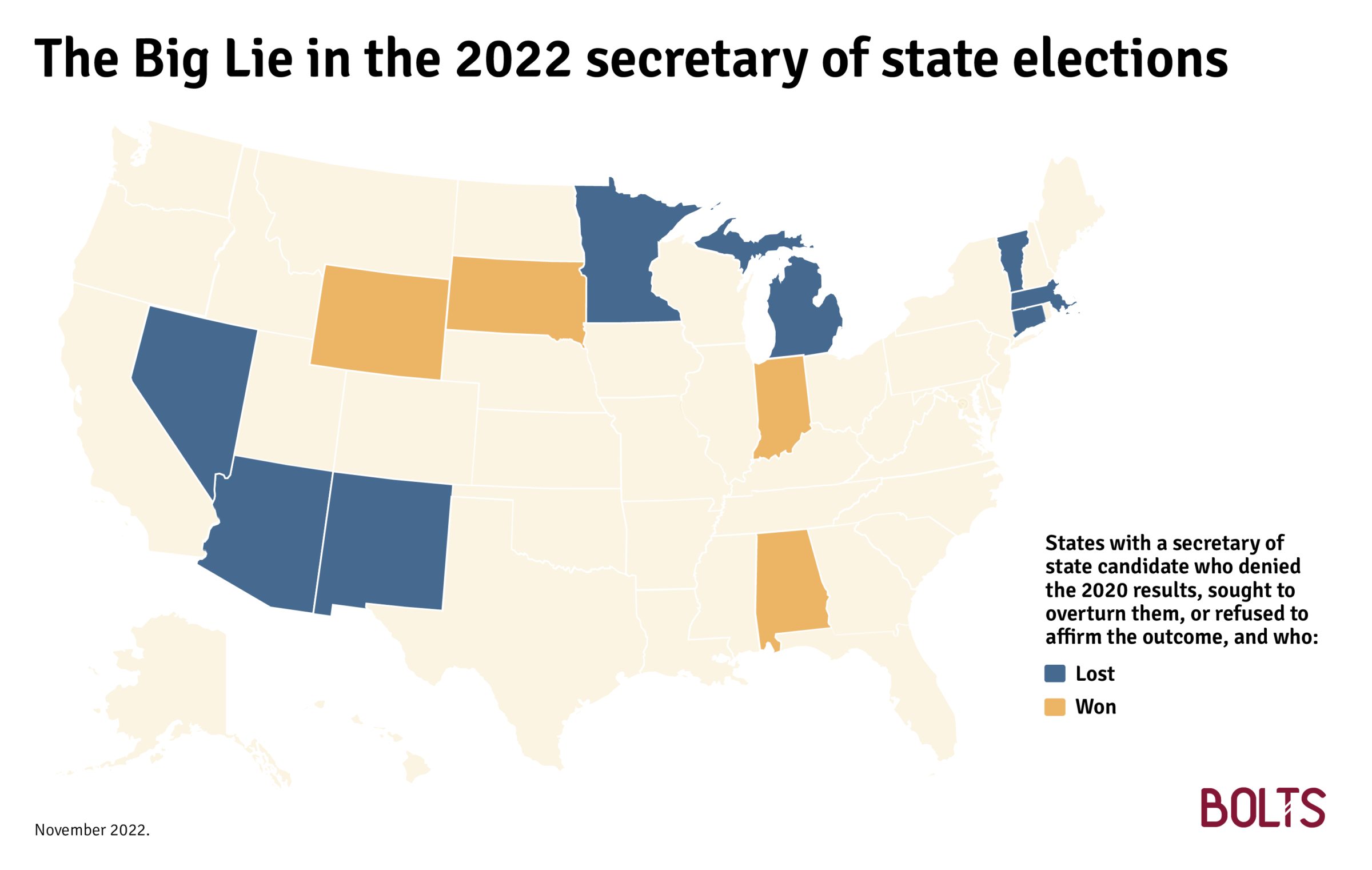
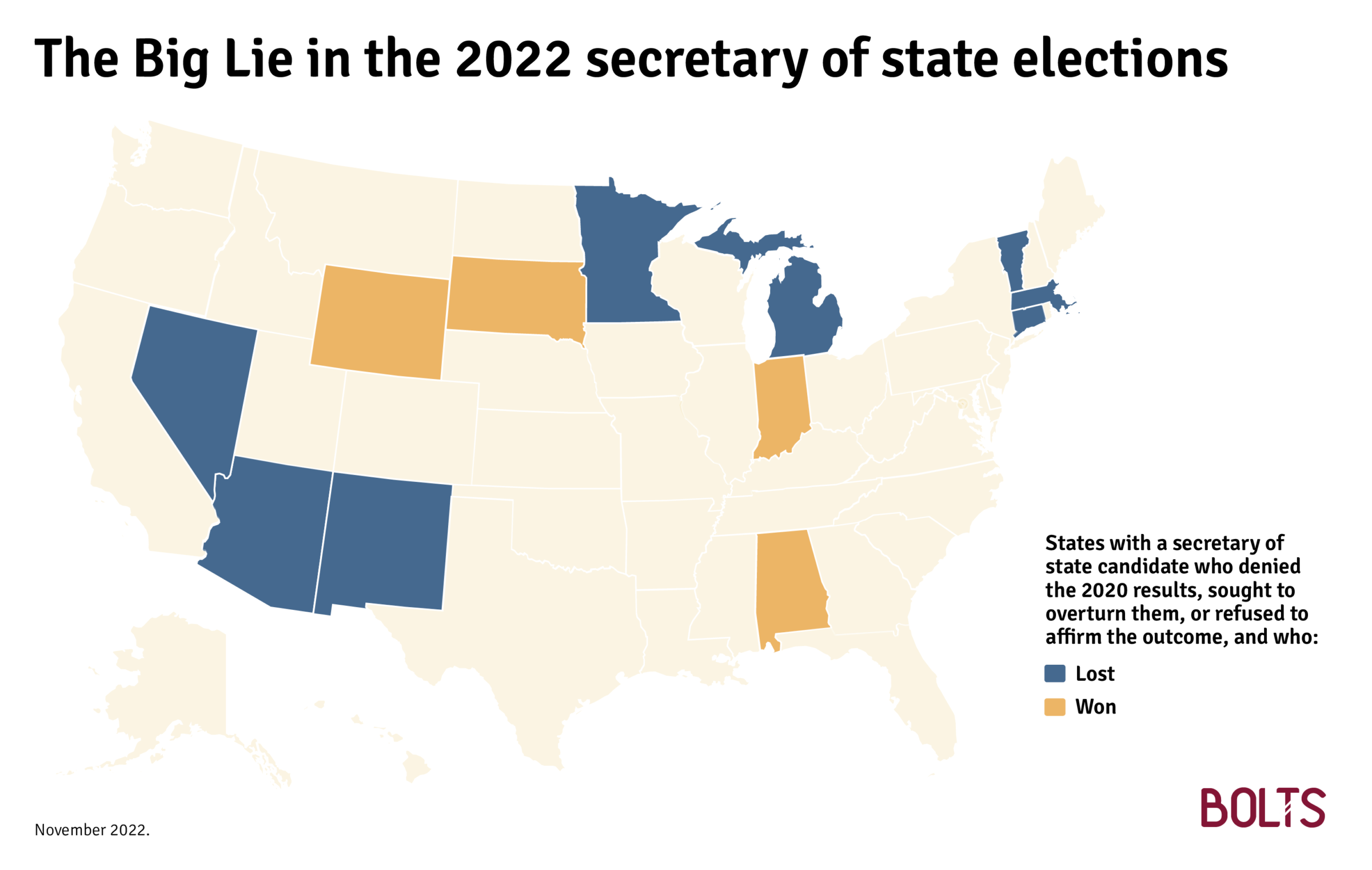
“What happened with the election results moved us from the precipice,” Rick Hasen, a professor at UCLA Law who specializes in election law and has written about the threat of election subversion, told Bolts. “We won’t have many election deniers running elections, and probably none or few in swing states.”
“Still there are hundreds of Republican candidates who embraced election denialism and won their races,” he said. “Maybe it’s just cheap talk and it is less worrisome—but it is still antidemocratic and shows that denialism could easily surface again in 2024 or beyond.”
Election deniers won many offices, from Congress down to county commissions, that have important powers when it comes to deciding how to run elections. And two governors with the authority to select secretaries of state, Ron DeSantis of Florida and Greg Abbott of Texas, won reelection; both have previously appointed secretaries who refused to affirm Biden’s election or helped Trump try to overturn the 2020 race.
Many states that did not feature outright election deniers still saw conflicts over new restrictions and rules to combat fraud. When the dust settled, incumbents did well: Democrats secured new terms in Colorado and Washington State, and Republicans did the same in Georgia, Iowa, and Ohio. In Connecticut and Vermont, Democrats prevailed in open seats who have signaled interest in expanding ballot access.
Some secretaries of state in recent years have stepped in against threats to election systems—and Tuesday’s results at least removed the threat that local election deniers will be bolstered by more sympathetic statewide officials, at least in blue and purple states.
Trujillo, the New Mexico Republican, had stood in solidarity with a county commission that refused to certify its primary results this summer over bogus fraud claims. The local county clerk, a Republican who fought back against the commission, told Bolts in September that Democratic Secretary of State Maggie Toulouse Oliver had backed her and that an election denier taking over instead would make her job trickier.
Some secretaries of state are also tasked with certifying their state’s final results, and election observers worried that an official like Finchem or a Mastriano appointee could try to not certify legitimate outcomes they don’t like. In states where they are not involved in certification, secretaries of state have other significant powers. Michigan, for instance, has one of the most decentralized electoral systems in the country, loosely held together by a secretary of state’s authority. Karamo, the GOP nominee, campaigned on proposals to upend this system, some of which she would not have had the legal authority to order.
Elections for secretaries of state typically happen away from the spotlight, but Trump’s Stop the Steal agitation morphed into an organized effort to recruit and run far-right candidates willing to follow his lead in disrupting U.S. elections.
Marchant, the Nevada candidate, played a lead role in putting together a national slate called “America First” that brought together 14 secretary of state candidates, all Republicans who ran on introducing election changes in line with Trump’s Big Lie conspiracies, such as cracking down on mail-in voting or ballot drop boxes.
In the lead-up to November, election deniers also partnered with far-right organizations and like-minded allies in law enforcement and sheriff’s offices to drum up policing and investigations into elections. Florida voted this year under the cloud of the arrests of formerly incarcerated people, who have been targeted by DeSantis’s administration amid shifting eligibility requirements for people with criminal records.
This national coordination among election deniers sparked a counter-mobilizing effort from Democrats who rushed to bring more voter attention to these races.
“Mr. and Mrs. Minnesota are not getting up every day saying, ‘Gee, I wonder what’s going on with the secretary of state’s office right now,’” Steve Simon, the Democratic incumbent in Minnesota, told Politico in October. “And so I do think that someone running for this office generically—me or anyone else—every four years, you’d have to treat it as an exercise of introducing or reintroducing yourself.”
The New York Times reports that Democrats sank nearly $50 million into TV ads for secretary of state races in the four tightest states featuring election deniers for secretary of state—Arizona, Michigan, Minnesota and Nevada—and outspent Republicans 10 to 1. Mastriano was also significantly outspent. He was one of only two candidates for governor on the “America First,” alongside the GOP nominee in Arizona, Kari Lake. Both had lost their bids as of Monday night.
Of the 14 “America First” candidates who ran for secretary of state, nine lost in Republican primaries and four lost in last week’s general election.
Those defeated in primaries include Colorado’s Tina Peters, a county clerk under indictment for breaching the integrity of voting machines, and Idaho’s Dorothy Moon, who once defended voter restrictions on the floor of the legislature based on unfounded allegations that Canadians are coming to Idaho to vote illegally. Others lost to Republican incumbents in primaries in Georgia, Kansas, and Nebraska.
The slate’s only victorious candidate is Diego Morales, who is now poised to take over as secretary of state in Indiana.
Morales echoed Trump’s claims about fraud and called the 2020 election a “scam” to oust the incumbent at the Indiana Republican Party’s state convention. He later softened those statements, calling Biden the legitimate president, but he remains on the website of the “America First” organization as of publication. He beat Democrat Destiny Wells, who hit him for his ties with the far-right, by 14 percentage points.
Three other candidates who espoused aspects of the Big Lie prevailed last week, though they were not part of the “America First” slate.
Much like Morales, Monae Johnson used conspiracist allegations about election systems to oust South Dakota’s incumbent at a party convention. Her general election was largely a formality in this staunchly conservative state.
In Alabama, winner Wes Allen has questioned the results of the 2020 election, and he has already signaled how that may affect his state. He said earlier this year that, should he win, he would withdraw Alabama from the Electronic Registration Information Center (ERIC), an organization that helps 32 states, and Washington D.C., maintain voter rolls. He explained his position by naming George Soros, shortly after a far-right website published an article that falsely tied ERIC to Soros.
In Wyoming, finally, Chuck Gray secured Trump’s endorsement to win the Republican nod for secretary of state in August, and then ran unopposed in last week’s general election. Gray has called the 2020 election “clearly rigged,” and has focused his attacks on the use of ballot drop boxes, echoing the debunked claims about the “woke left” using drop boxes to steal elections. He has also traveled to other states to meet with election deniers and observe their efforts to sow doubts on results.
These four states are deeply Republican, and the next presidential race is unlikely to be contested in any of them. Still, Democrats are competitive in plenty of elections in those states. Last week, Democratic U.S. Rep. Frank Mrvan’s re-election bid in Indiana was one of the nation’s closest watched. In 2017, Democrats gained a U.S. Senate seat in Alabama, in a special election that Republican nominee Roy Moore tried to block in court in an eerie trial run of Trump’s efforts in late 2020. Republican primaries can be competitive and need to be certified as well.
“It’s a danger to American democracy for people detached from reality and in hock to a political cult to hold governing responsibilities no matter what state they’re in,” Bassin said. “That’s true just as a matter of principle and democratic health, but it’s also the case that even the most deep red states have had contentious elections in recent years and will again.”
“No one should have to rely on a delusional partisan to oversee their elections,” he added.
Since Tuesday’s clobbering, few election deniers have shown a willingness to accept the outcomes. Mastriano, perhaps chastened by the magnitude of his defeat, issued a concession on Sunday evening. “Difficult to accept as the results are, there is no right course but to concede, which I do,” he said in a statement on social media.
But Finchem retweeted a message last week from a supporter who called the outcome a “Soros orchestrated psychological operation!” after the media called the race for Democrat Adrian Fontes, and he has since repeatedly insinuated that voter fraud was at play.
And those who won now have a platform from which add the imprimatur of a state agency onto baseless allegations of widespread voter fraud.
On Saturday, four days after becoming Wyoming’s Secretary of State-Elect, Gray posted a picture of himself at an event with a conservative activist, former Trump campaign adviser, and also president of the organization Citizens United, who most recently produced a movie that Trumpworld has embraced about the 2020 election. Gray tweeted, “Really enjoyed meeting David Bossie today and seeing his film Rigged.”
The article has been updated with the most up-to-date results as of the evening of Nov. 14.



